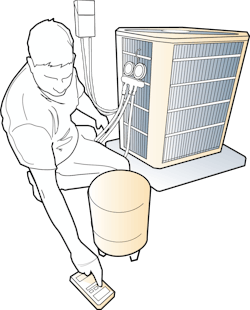
When I was a kid, I constantly asked my parents questions about things I didn’t understand. Those questions always began with “why”. To their credit, they patiently answered me and encouraged me to keep asking. If you’re a parent, you’ve no doubt experienced this with your children. Kids are naturally curious and love to learn. Many maintain this zeal as they grow older, while others simply stop caring. Have you ever wondered why?
Setting the Stage for Traditions
The responses you got to questions when you were younger shaped your views and beliefs. If your parents encouraged you to ask questions, you likely did so with no fear. Learning was fun. However, if your parents acted frustrated with you whenever you asked questions, you probably didn’t ask many out of fear of their response. Learning was a punishable offense.
As years pass, we sometimes forget where and how our views and beliefs originated. We gradually accept them and stop questioning the source. They can become traditions and eventually evolve into commonly accepted truths.
For those of us who appreciate doing HVAC the right way, is it possible some things we believe to be true aren’t true at all? Is it possible the way we originally learned the business stunted our learning and caused us to have biases we’re unaware of? Could we be guilty of blindly following those traditions instead of questioning them?
Is it possible the way we originally learned the business stunted our learning and caused us to have biases we’re unaware of?
In their book Competing for the Future, authors Gary Hamel and C.K. Prahalad describe an experiment involving four monkeys. Many have questioned the story’s authenticity, but it doesn’t take away from its value of examining the problem of blindly accepting certain traditions.
The Four Monkeys
In the story, scientists place four monkeys in a large cage. In the center of the cage, the scientists hung bananas using a string. Underneath the bananas are stairs for the monkeys to use to easily reach the fruit. After a few minutes pass, one monkey sees the bananas and moves towards the stairs. As he slowly climbs one step and then the next, the scientists spray all four monkeys with ice-cold water.
Some time passes and a second monkey gets brave enough to try. Once again, the scientists spray all four monkeys with frigid water. More time passes and a third monkey tries for the bananas and the others attack him.
The scientists turn off the water and replace one of the original monkeys with a new one. Once the newcomer sees the bananas, he tries to go up the stairs. You guessed it, the other three immediately attack him. After some time passes, he tries to climb the stairs again, but the other three attack him once more. Beaten down, the newest monkey now knows you don’t go after the bananas, or you’ll get beaten up. It’s something he learned to accept.
The scientists remove another of the original monkeys from the cage and replace him with a new participant. In an instant, the newest monkey heads straight for the bananas and the others immediately attack him. The previous newcomer also joins in on the attack.
This cycle continues as the researchers replace the third original monkey with a newcomer. Once again, the newest monkey goes for the bananas, but the others attack him before his feet hit the second step. Two of the monkeys attacking the newcomer have no idea why they’re doing it – they’re simply following a tradition.
Researchers finally replace the original fourth monkey. All the monkeys who felt the spray of the ice water are now gone, yet none of their replacements will go after the bananas. Why? Because that’s the way it’s always been. It’s a tradition they’ve all learned to accept.
Who Influences You?
Is it possible we have stopped challenging assumptions and traditions now held as truths in the HVAC industry? Have we stopped asking why and started blindly accepting things we are told as facts instead of going out and proving them for ourselves?
How many “industry veterans” verbally berate new installers, technicians, and salespeople who question why things are done a certain way? These “newbies” want understanding and seek new information. Instead, they get sprayed with ice water from the very ones they look to for wisdom and encouragement. The enthusiasm these newcomers have for the industry is slowly crushed when they hear, “This is the way we’ve always done it.” or “Just do it this way and don’t worry about it.”
When the ‘why’ isn’t valued , we begin to accept unfounded assumptions as truths.
As an industry, and as individuals, we should never stop asking why. When the ‘why’ isn’t valued , we begin to accept unfounded assumptions as truths. Time for a tough question. Have you ever accepted any of these assumptions as truth? I know I have.
- The existing duct system works just fine
- Ducts should always be sized at a .10 friction rate
- 500 square foot per ton is the only way to size equipment
- There’s plenty of airflow because a register blows hard
- Tight ducts are right ducts
- Equipment rated at 20 SEER automatically operates at 20 SEER in the field
- You can fix the system when you fix the equipment
- You have to connect your gauges on every service call.
While this isn’t an exhaustive list, you get the idea. If you accept any of these assumptions (or others like them) as truth, you need to ask yourself why. You’re likely accepting assumptions and traditions as truth. With the test instruments and training available today, you can prove what’s true and what’s fiction. There are a host of resources out there that make learning and questioning traditions easier than ever. You don’t have to ask why alone.
Our industry has tons of opportunities that remain hidden because we quit asking why. Don’t let the fear of getting sprayed keep you from climbing the steps and asking questions that get to the truth. Unless you do, you’ll never achieve your potential in our industry.
If you’re an HVAC contractor or technician interested in learning about how to debunk HVAC traditions, contact David at ncilink.com/ContactMe. NCI’s website www.nationalcomfortinstitute.com is full of free information to help you improve your professionalism and strengthen your company.
About the Author
David Richardson
Director, technical curriculum
David Richardson serves the HVAC industry as director of technical curriculum at National Comfort Institute, Inc. (NCI), Avon, Ohio. NCI specializes in training that focuses on improving, measuring, and verifying HVAC and Building Performance.
